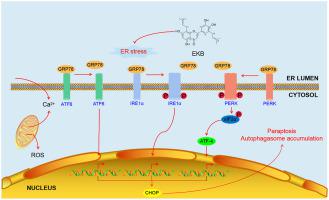Chemico-Biological Interactions ( IF 4.7 ) Pub Date : 2022-08-23 , DOI: 10.1016/j.cbi.2022.110125 Hao Zheng 1 , Qingying Liu 1 , Shuqi Wang 1 , Xiaoqing Liu 1 , Mengjiao Ma 1 , Tao Shen 1 , Xiaoning Wang 1 , Dongmei Ren 1

|
Epimedokoreanin B (EKB) is a prenylated flavonoid isolated from Epimedium koreanum. In this article, we described the anti-cancerous effects of EKB and its underlying mechanism in human non-small cell lung cancer (NSCLC) A549 and NCI–H292 cells. EKB treatment inhibited cell proliferation and migration accompanied by cytoplasmic vacuolation in both cell lines. The cell death induced by EKB lacked the features of apoptosis like chromatin condensation, phosphatidyl serine exposure and caspase cleavage. The vacuoles stimulated by EKB predominantly derived from endoplasmic reticulum (ER) and mitochondria dilation, which are the characteristics of paraptosis. Down-regulation of Alix and up-regulation of ER stress-related proteins after EKB treatment further supported the occurrence of paraptosis. ER stress inhibitor 4-phenylbutyric acid (4-PBA) and protein synthesis inhibitor cycloheximide (CHX) treatment antagonized the vacuoles formation as well as cell death induced by EKB, indicating that ER stress was involved in EKB induced paraptosis. In addition, autophagosome accumulation accompanied with autophagy flux blocking was observed in EKB treated cells, this was consistent with the occurrence of ER stress. Collectively, EKB was demonstrated as a paraptosis-like cell death inducer in A549 and NCI–H292 cells. The inhibitory effect of EKB on lung cancer cell proliferation was further demonstrated in a zebrafish xenograft model. These findings raise the possibility that paraptosis inducers may be considered as alternative choices for lung cancer therapy.
中文翻译:

Epimedokoreanin B 通过内质网应激介导的下垂并伴有自噬体积累抑制肺癌细胞的生长
Epimedokoreanin B (EKB) 是一种从淫羊藿中分离出来的异戊烯化黄酮类化合物。在本文中,我们描述了 EKB 的抗癌作用及其在人类非小细胞肺癌 (NSCLC) A549 和 NCI-H292 细胞中的潜在机制。EKB 处理抑制了两种细胞系中伴随细胞质空泡化的细胞增殖和迁移。EKB诱导的细胞死亡缺乏染色质浓缩、磷脂酰丝氨酸暴露和caspase裂解等凋亡特征。EKB 刺激的液泡主要来源于内质网(ER)和线粒体扩张,是下垂的特征。Alix的下调EKB 治疗后 ER 应激相关蛋白的上调进一步支持了下垂的发生。ER 应激抑制剂 4-苯基丁酸 (4-PBA) 和蛋白质合成抑制剂环己酰亚胺 (CHX) 处理拮抗 EKB 诱导的液泡形成和细胞死亡,表明 ER 应激参与 EKB 诱导的下垂。此外,在EKB处理的细胞中观察到伴随自噬通量阻断的自噬体积累,这与ER应激的发生一致。总的来说,EKB 被证明是 A549 和 NCI-H292 细胞中的一种凋亡样细胞死亡诱导剂。在斑马鱼异种移植模型中进一步证明了 EKB 对肺癌细胞增殖的抑制作用。这些发现提出了一种可能性,即截瘫诱导剂可能被认为是肺癌治疗的替代选择。






























 京公网安备 11010802027423号
京公网安备 11010802027423号